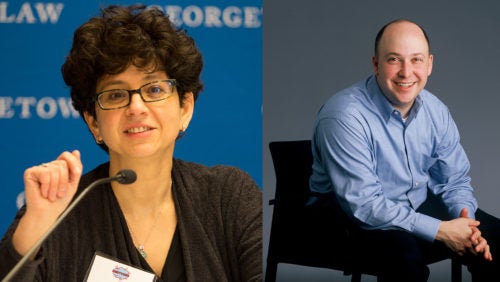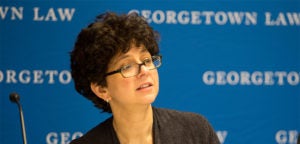Professor Anna Gelpern, Professor Adam Levitin To Host Groundbreaking Law and Macroeconomics Conference at Georgetown Law
September 19, 2019

Professor Anna Gelpern and Professor Adam Levitin will host a Law and Macroeconomics conference at Georgetown Law, featuring a number of top law and economics scholars from Georgetown and beyond.
Professor Anna Gelpern and Professor Adam Levitin met on a bus in Connecticut, going to an academic conference for junior scholars in May 2008. Levitin, a bankruptcy, commercial law, and financial regulation expert, had joined the Georgetown Law faculty the year before. Levitin would later recruit Gelpern, then a law professor at American University, to Georgetown Law in 2013.
On September 27-28, the pair will host a Law and Macroeconomics conference at Georgetown Law, featuring a number of top law and economics scholars from Georgetown and beyond. These include former Federal Reserve Chair Janet Yellen, and Georgetown Law Professor/former Federal Reserve Governor Dan Tarullo.
We sat down with Professors Gelpern and Levitin for an interview.
Gelpern’s research focuses on government debt, contracts, and regulation of financial institutions and markets. She is a Non-Resident Senior Fellow at the Peter G. Peterson Institute for International Economics. Gelpern has previously served as an expert for UN debt and financial reform initiatives, held visiting appointments at Harvard and Penn law schools, worked in legal and policy positions at the U.S. Treasury Department, and practiced with Cleary, Gottlieb, Steen & Hamilton in New York and London. She has won scholarship awards and fellowships from the Ford Foundation and the Council on Foreign Relations.
Levitin specializes in bankruptcy, commercial law, and financial regulation. His scholarship has won numerous awards, including the American Law Institute’s Young Scholar’s Medal, in recognition of his work’s potential to influence improvements in law. Levitin previously practiced in the Business Finance & Restructuring Department of Weil, Gotshal, & Manges and served as law clerk to the Honorable Jane R. Roth on the U.S. Court of Appeals for the Third Circuit. Levitin previously served as the Bruce W. Nichols Visiting Professor of Law at Harvard Law School, as the Robert Zinman Scholar in Residence at the American Bankruptcy Institute, as Special Counsel to the Congressional Oversight Panel for the Troubled Asset Relief Program, and on the Consumer Financial Protection Bureau’s Consumer Advisory Board.
Talk about this Law and Macroeconomics conference. Why is there a need, and why now?

Professor Anna Gelpern.
Professor Gelpern: We have had this phenomenally successful law and economics movement that goes back to the mid-twentieth century, but it has joined legal and economic research in fairly discrete ways. Having entrenched a particular microeconomic approach to analyzing the law, it has come to feel intuitive at a super-basic level – “reasonable man makes efficient contract,” “least cost avoider pays for tort,” “tradable property finds happy home”– with an asterisk or two for irrationality, bad information, and harm to bystanders that might justify public intervention.
But almost since the beginning of the law and economics movement, there has been this question, what about macroeconomics? It is not nearly as intuitive. Macroeconomics is about aggregates, about an economy as a whole – aggregate supply and demand, not supply and demand for discrete products and services, like laptops or cappuccino at Starbucks. It considers money and overall price levels, inflation and inflation expectations, unemployment, consumer and government spending, investment, and growth in the national economy, not a particular market. Then there is the global dimension – trade, currencies, international capital flows – and the time dimension, the ups and downs of the business cycle. It’s about the big picture, where entire populations and complex political institutions are the protagonists. Of course you could model a government as the same old “reasonable man” of the 1L curriculum, but the intuition has not taken hold.
In the 1990s and early 2000s, we saw a small handful of articles that asked how the law might mitigate the impact of economic downturns on unemployment, advance inter-generational justice with tax and environmental policies, and improve fiscal policy. After the financial crisis of 2007-2009, a huge torrent of scholarship starts appearing on how crises happen, how do you prevent crises. Some of it is fairly conventional bank and securities regulation, but some also ventures farther afield, reconsidering institutional designs for money and fiscal federalism, or the macroeconomic impact of bankruptcy foreclosures. Meanwhile, economists have been asking more and more legally inflected questions about fiscal rules, central bank governance, and institutional commitment devices to bind sovereign governments.
When the European crisis comes along, more interesting questions start to emerge – for instance, what is a bailout? How do you draw the line between fiscal and monetary policy when the European Central Bank buys Greek government bonds?
Most of the post-crisis writing on these and similar questions does not self-identify as law and macroeconomics, but it clearly deals with questions of macroeconomic significance, and channels macroeconomic theories (consciously and unconsciously).
Adam and I have been mulling these questions for a really long time, both of us, based on our law practice and policy work, as well as some of our co-authored research from around 2009. We thought that now was a good time to look back and take stock, since we might have a critical mass of scholarship. Some of it has not identified as law and macro, but there is also a lot of newer scholarship that is more self-consciously engaging law and macroeconomics — one of our conference participants, Yale Professor Yair Listokin, has even published a book called Law and Macroeconomics. We thought it would be a good idea to bring all these strands together. And we wanted to frame it really broadly.

Professor Adam Levitin.
Professor Levitin: The first generation of law and economics scholarship often tended to point to more conservative policy proposals, or at least be embraced by people who had more conservative politics. The label “law and economics,” for many people, still bears that political valence. But it’s really moved beyond that. For people that work in this area, it’s become clear that there’s really no political bent to it…
Why now? We started thinking about this two summers ago, but there have been a number of events in the news in the past few months that have underscored the need for some more critical thinking on the relationship between law and macroeconomics. For example, we’ve seen the issue of Federal Reserve’s independence vis-à-vis the president appearing on the front page of the newspaper. We’ve seen the furor in Congress around Facebook’s proposed Libra currency. If Libra ever gets off the ground, it could challenge the government’s monopoly on currency. These are issues with enormous macroeconomic importance, but they also underscore the importance of institutional design and governance structures, which are legal questions.
What is the first-generation scholarship?
Professor Levitin: [For economic analysis of law,] that’s the work produced starting in the ’70s and running to the mid ’90s. The giants doing the early work were Guido Calabresi and Richard Posner, although they stood on the shoulders of Ronald Coase, an economist whose work on transaction costs and externalities was really critical to thinking about corporate governance, contracts, and torts in particular. There was a fairly small number of people doing law and economics in the 1970s. The field began to expand in the 1980s. It still was mainly informal economic modeling that was concerned with arguments about what legal rule would be more efficient. The field was generally focused on areas like contracts and torts, where efficiency was being evaluated in a universe that typically consisted of two parties; the effects of a legal rule on third parties or on society as a whole were of particular interest to the scholarship.
By the late ’90s, you are starting to see other scholars take some of the intellectual moves of law and economics and apply them in new ways… In particular, you start to see both empirical economic analysis and also the integration of behavioral economics into law and economics. Whereas first generation scholarship was built on the idea that everyone is a rational actor, the behavioral economics turn started to integrate the fact that people don’t always behave rationally and how law should address that.
What inspired you to go into this field?
Professor Gelpern: I had never really internalized law and economics, either the classical version or the behavioral version. But I practiced on Wall Street, represented borrowing governments, and then I worked at the U.S. Treasury. I was with people preoccupied with macroeconomic problems and the international dimension in particular – growth, recessions, currency and government debt crises. It seemed strange that the legal academy was paying virtually no attention to that aspect. I also saw economists treat law as fixed background rules, sitting there like trees. Maybe you need to cut or plant a tree once in a while, but it was a thin and static view — whereas in law school, we experience laws and regulations as infinitely complicated, malleable, living, breathing things.
For me, when the Asian financial crisis hit in 1997-1998, that’s when the light bulb went on. A crisis is this fascinating moment when everything stops. It’s not just one debt contract that defaults, it’s all of them … Fixing the contract problem on an economy-wide scale is totally unlike finding a remedy for a single contract breach. The fix is political, constitutional — sometimes you are redistributing on revolutionary scale. Crises challenge fundamental structures of economy and society, and our basic assumptions about how the world works. There is also the shift from private to public law. That’s the problem that excited me then, and excites me now.
Adam and I did an article about mortgage modification in 2009, and we looked to the Great Depression, and a moment when they didn’t tinker with individual contracts, they rewrote all of the contracts…
Professor Levitin: I got interested in this area during the 2008-2009 financial crisis, seeing the political turmoil caused by attempts to stabilize the economy. This was something I was dealing with in a first-hand way in my work reporting on foreclosure prevention efforts for the Congressional Oversight Panel. On the one hand, there were people who were upset that the government wasn’t doing more, wasn’t being as effective as it might have been in how it tried to stabilize the economy. I put myself in that camp.
On the other hand, there were people who were furious that the government was intervening in any way in the economy, that the government was bailing out private firms. But it wasn’t just foreclosures. It was also things like GM and Chrysler bankruptcies, where the federal government effectively provided a bailout through bankruptcy, as well as the bailouts of the large banks. Bankruptcy was the original area where I did most of my scholarship. In 2008-2009 you had a lot of people in the bankruptcy world saying, why are these companies getting bailed out? Just run them through bankruptcy or FDIC receivership… But bankruptcy doesn’t recognize communities. If an auto manufacturer goes out of business, it doesn’t just affect employees, it affects retirees…communities would be devastated with unemployment, with lost tax revenue, and the bankruptcy system has no way of accounting for that. It’s designed to deal with a small business that fails, clean it up, move on, not with social spillovers from business failure.
What are some of the highlights of the upcoming conference?
Professor Gelpern: It is a rich and diverse group in every way. There is geographic diversity, especially appropriate for a conference presented by the Institute of International Economic Law at Georgetown, a diversity of disciplinary and policy perspectives, a mix of academics and practitioners, current and former officials from international organizations, central bankers, think tank presidents, and more.
As for the highlights, the conference will open on Friday with remarks by the Vice-Chair for Supervision of the Federal Reserve Board, Randal Quarles. He is a lawyer by training, and practiced for many years, but also held senior policy positions at the Treasury and worked in the financial industry before coming to the Fed. In addition, he chairs the Financial Stability Board, a global body coordinating financial regulation. Most importantly, he is a truly thoughtful guy with a unique vantage point on the global economy, U.S. and international institutions, and insights into this administration’s policies.
Capping off the first day is a conversation between former Federal Reserve Chair Janet Yellen and our Georgetown Law colleague and former Federal Reserve Governor Dan Tarullo, who is away teaching at Harvard now. It is a rare privilege to have such serious and influential thinkers engage with our project.
Dan is even writing an essay for the symposium volume, which Adam and I are co-editing, and where most of the conference papers will come out. The journal Law and Contemporary Problems is published by Duke Law; it specializes in guest-edited issues entirely devoted to exploring a single theme or research area, with a premium on policy relevance. We thought it was a terrific fit for this effort to frame a field of inquiry.
Conference paper topics run the gamut from what you might expect – money, inflation, fiscal rules, financial regulation – to others not normally associated with macro, such as antitrust, contracts, and development. What we’ve tried to do throughout is to mix papers by lawyers with commentary by economists, and vice versa. We also deliberately sought to bring together scholars at different stages of their careers, from world-famous to those just starting out.
When we began putting it together, Adam and I had a minor epiphany – we could do a law and macro volume with Georgetown law faculty alone. For instance, Professor David Super has written a phenomenal fiscal federalism article… Professor Brian Galle has written about countercyclical tax policy. Professor Eloise Pasachoff writes about federal budget institutions – to name just a few. We also have excellent real economists on our faculty, many with years in public service.
In the end, we decided to do it the conventional way, with a mix of outside and Georgetown faculty speakers, and we are thrilled to have nearly a dozen of our colleagues participating. We were also lucky to be able to draw on friends and colleagues from our practice and policy lives, and even some former students.
Professor Levitin: Our goal is to make this a field-defining conference. There have been isolated law and macroeconomics papers before, and no one’s ever managed to launch a field of law and macroeconomics… There is the recent law and macroeconomics book by Yair Listokin that focuses on countercyclical law and regulation, but we see law and macroeconomics as a much more expansive endeavor. Yair will speak at the conference and contribute to the volume, but we are also trying to broaden the lens and get other scholars thinking about their work as law and macroeconomics. There are a lot of scholars whose work is effectively law and macroeconomics, but they don’t think about it as such. If they start thinking about it in those terms, and start talking about it those terms, they are going to have some different ideas. We’re really excited about teeing off this conference. We think it’s going to create a richer body of work that will stand on its own as a field of legal scholarship.